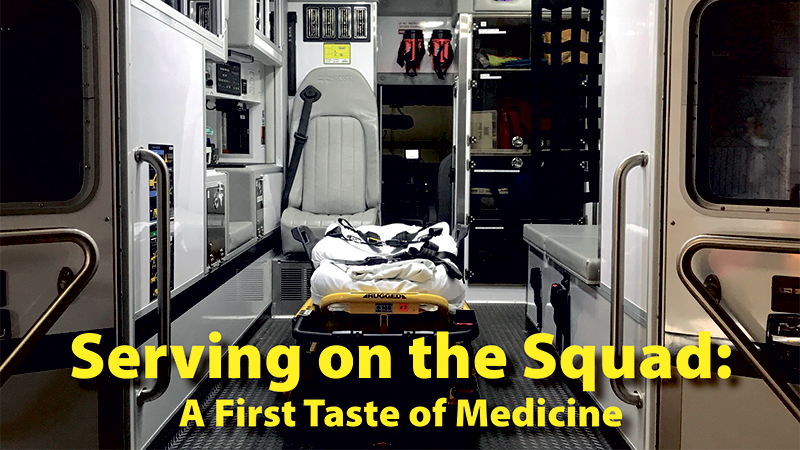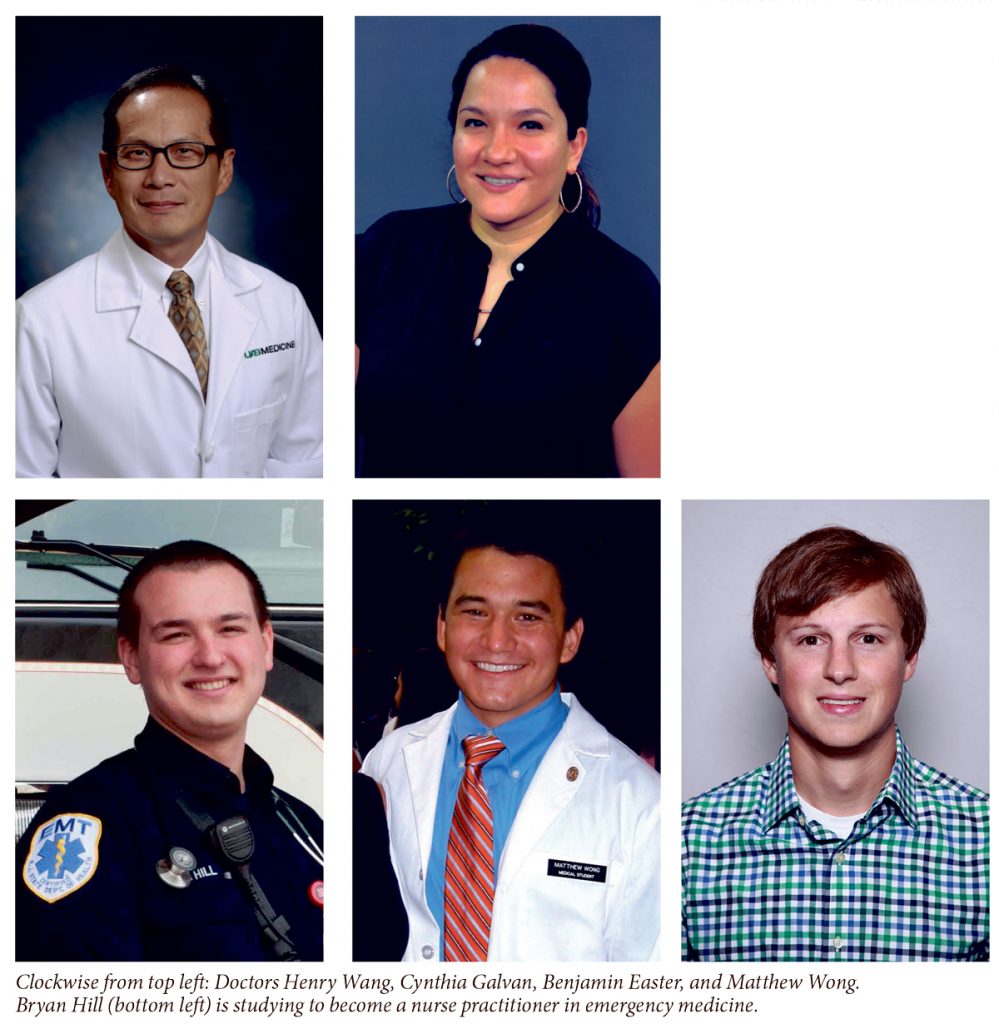
04 Jul Serving on the Squad: A First Taste of Medicine
Princeton Magazine
Summer 2017
by Anne Levin
“PFARS is something the Princeton community should be very proud of and I hope it recognizes what a gem it has.”
When Henry Wang started his first year at Robert Wood Johnson Medical School, he expected to give up his volunteer duties on the Princeton First Aid & Rescue Squad in order to devote full attention to his academic studies. Dr. Wang soon discovered, however, that serving on the front line of an emergency call was a key part of his medical education.
“I found myself spending more time in the Squad house because it made medicine even more interesting,” says Wang, today an emergency physician, health researcher, and professor at the University of Alabama at Birmingham. “Being on the Squad, figuring out what was ailing a patient, and getting them where they needed to be in that crucial first hour – there is nothing more valuable.”
Wang is among a long line of young men and women who have served on the first aid squad and gone on to pursue careers in medicine. The Squad boasts alumni who specialize in cardiology, anesthesiology, ophthalmology, pediatric infectious disease, general surgery, among other health fields.
Jonathan Javitt, the founder and CEO of NeuroRX Inc., a pharmaceutical company focused on curing central nervous system disorders, was a member during his years at Princeton University in the 1970s.
“If not for my PFARS experience, my second son would have died at birth,” he wrote in an email. “I resuscitated him in the OR of a major teaching hospital while the doctors stood by uselessly.”
Not surprisingly, the most popular specialty among PFARS veterans is emergency medicine. Cynthia Galvan, who joined in her junior year at Princeton University, is today a managing partner of Northwest Emergency Associates in Gary, Ind.
Princeton native Matthew Wong, who served on the Squad from his sophomore year in high school through college, is an emergency physician at Beth Israel Deaconess Medical Center and an instructor in emergency medicine at Harvard University.
Then there is Ben Easter, a PFARS member during his undergraduate days at Princeton, and today the Administrative, Operations, and Quality Fellow in the Department of Emergency Medicine at the University of Colorado School. The list goes on …
“I knew going into college that I wanted to go to medical school,” says Easter. “I think what attracted me about PFARS is that so much of the work at the college level is academic, and I really liked the idea of doing actual patient care. I considered general and orthopedic surgery during medical school but I ultimately decided on emergency medicine. I loved the idea of taking care of every single patient no matter their age, gender, medical problem, or situation. I still love the idea that in the ER we take care of everyone with no questions asked. I got that from PFARS.”
The number of volunteers who choose emergency medicine as a career does not surprise Mark Freda, president of the Squad.
“A lot of university students join the Squad because they believe it will help them when they go to medical school, and maybe it does,” he says. But people who stay with the Squad really enjoy helping others”

Cynthia Galvan was a pre-med student when she joined the Squad in her third year at Princeton. “It was a way to be more clinical at a time when I couldn’t be otherwise. I was running a lab doing surgery on rats, and the Squad gave me a chance to be clinical with human beings much earlier than when you generally would get that chance.”
Galvan looks back fondly on her two years with the Squad. “It was just this wonderful organization to be a part of. You felt like you were doing a good thing for the community and the Squad is so incredibly unique. Highly motivated, intelligent people with good hearts run it,” Galvan says.
Matthew Wong started volunteering at PFARS during his sophomore year at Princeton High School. “I always had an idea that I wanted to go into medicine. My dad is a local doctor [Michael Wong of the Princeton Eye Group] and my mom is a nurse, so I knew what it looked like to help other people.”
Serving on the Squad was “one of the best things I ever did,” Wong says. “I take care of people in emergencies full-time now and I trace those roots right back to my days at PFARS.”
Among those currently serving on the first aid squad is Bryan Hill, a graduate of Princeton High School and Rutgers University Class of 2017. “From a young age, I have been really interested in medicine and helping people,” Hill says.
“Serving on the Squad helped me to recognize that I want to do something in clinical medicine.” Hill plans to earn a doctorate in nursing practice and become a nurse practitioner in emergency medicine.
“I was only in third grade when 9/11 happened and although I wasn’t affected directly, I guess being so close to New York kept it in the back of my mind,” Hill says. “That’s when I became interested in rescue in addition to wanting to go into medicine.”
Working on the rescue squad also convinced Henry Wang that emergency medicine was his future. “In my view, being on the front line is the most important part of the health care system. It’s how people gain access to it. A lot of what I did with PFARS resonates today with what I try to teach new students.”
New Jersey has the largest cadre of volunteer squads in the United States but local squads are struggling to stay afloat as advances in emergency medicine create a need for members who are both medically and technologically savvy. Still, says Dr. Wang, “New Jersey has a unique model in that volunteers are still a very prominent part of the system.
While we struggle with the question of whether volunteer service is still viable, I know that the way we did it at PFARS was an absolutely safe and very effective way to provide patient care. PFARS is something the Princeton community should be very proud of and I hope it recognizes what a gem it has.”


